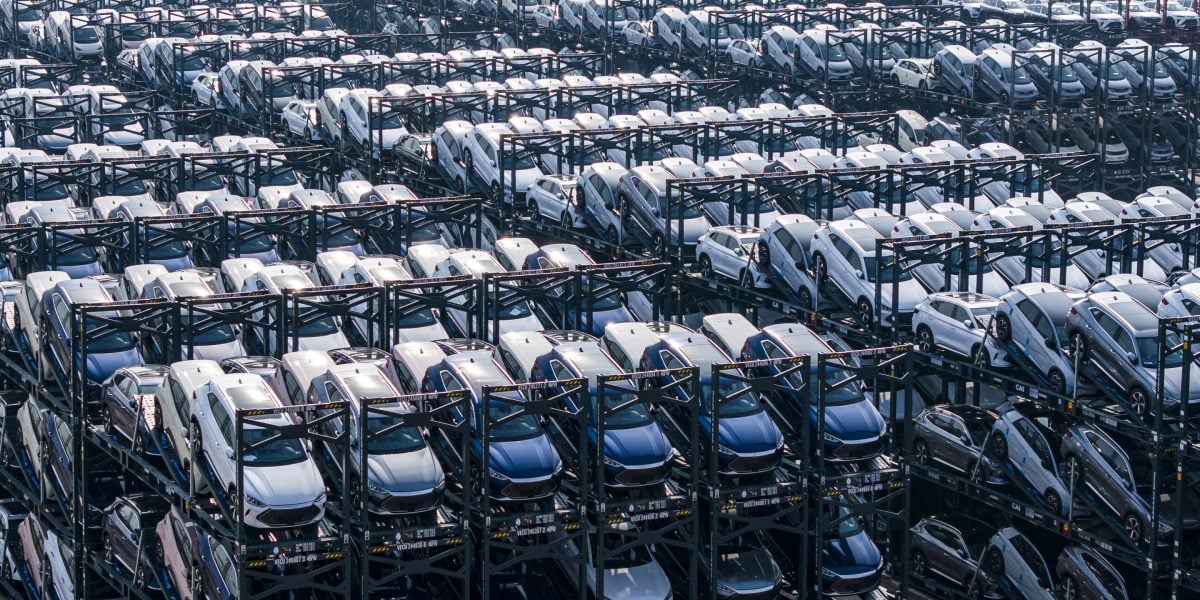China has become a powerhouse in electric vehicles. Its automaker BYD recently topped Tesla in global EV sales, with Elon Musk warning of Chinese carmakers, “If there are no trade barriers established, they will pretty much demolish most other car companies in the world. They’re extremely good.”
On Friday, the Alliance for American Manufacturing sounded the alarm, issuing a report entitled: “On a Collision Course: China’s Existential Threat to America’s Auto Industry and its Route Through Mexico.”
The report, which lists policy recommendations to combat overcapacity and unfair trade practices, notes that BYD is building factories in Thailand and Hungary designed to be regional export hubs. It then adds:
“More alarming, however, are Chinese firms’ heavy spending on plants in Mexico, through which they can access the United States by way of the more favorable tariffs under the United States-Mexico-Canada Agreement (USMCA). This strategy is, in effect, an effort to gain backdoor access to American consumers by circumventing existing policies that are keeping China’s autos out of the U.S. market.”
I keep seeing articles about how US car companies and car rental corps are backing off from EVs due to lack of demand.
So, which is it? Worried there might actually be demand if there are reasonably priced alternatives?
There is not enough demand for $120k EVs, theres plenty of demand for reasonable priced ones
Naw. You already have the people who really want to be in EVs. You have to convince the rest.
PHEV is what Americans actually want.
Pure electric most days, no range issues for long trips, more power in sports cars.
deleted by creator
If you’re willing to go used, I got my 2019 bolt for 14k. It’s still more than the 5k you got for a gas car, but it pays the difference in lower fuel cost.
deleted by creator
Hard disagree.
I’d love to save on gas and maintenance but there’s no affordable EVs for a family of 5. I’m not spending 50k+ on a Hyundai crossover.
Yeah, the bolt is really the only cheap EV, and it’s not really suited for a family of five. (Though it does have five seats)
Yeah, and the the EV9 (3-row) is $60k (not remotely cheap, but the cheapest I’m aware of). It’s obviously worth checking the 5-year cost proposition (given fuel vs. electricity pricing), but if the math doesn’t work out for your driving needs, then you’re pretty well out of options for now.
Most Americans have no idea what PHEV even is
As a Volt owner for the last 8 years I am forced to agree.
I agree and it’s a shame. We’d be much further along if Ford was hyping the f150 PHEV vs the unobtainable and functionally worthless for towing f150 for instance.
Infrastructure is what I hear the most. Apartments don’t have a way to charge vehicles, and gas stations don’t have the chargers everywhere. So people don’t know where to find them unless they actually have an EV. That said, it costs a lot less to charge an EV at home. If you have to get your charge elsewhere costs go up. Still better than gas most places but locating them and possible wait time scares new users.
More apartments are getting on board. A friend of mine lives in an apartment building from the 1980s and the management just installed outlets for folks with plugin hybrids and is planning on adding NACS.
They’re redoing the parking where I work and will be adding EV chargers for employee and visitor use.
It may not be a concerted effort but the infrastructure is growing.
There are plenty of people who are building their own EVs or converting their ICE vehicles.
I wonder if Range Anxiety is just another flavour of the way we tend to overbuy cars.
“I bought a F150 when a Mirage is better suited because 3 days a year I carry a sheet of plywood” turns into “I paid for a 500km battery pack even though my regular errands are 75km or less because once a year I go on a 400km road trip.” Avis exists, you know?
State intervention might have helped-- a standardized, modular battery pack and bootstrapping an exchange network might have given us 10-minute exchanges until charging tech advanced. I notice that people don’t seem moved by the newest “charges 75km in 10 minutes” stories, which might also be a failure of marketing-- thry still want the needle on F.
I went through this a little bit myself. My car has absolutely no utility whatsoever, which makes it a bit awkward as I get into woodworking and other physical hobbies. But the reality is, it costs me less than $100 including gas to rent a uhaul for a day. It’s a bit inconvenient that I can’t go buy stuff on a whim, but with a little bit of planning it’s ridiculously cheaper for me to just rent a uhaul every once in a while rather than buy a new car.
Nobody wants to rent a car when they need to travel long distances. It’s a pain in the ass.
If you get say a Volvo it has about 275 mile range. DC charge time at a fast charger while on a trip takes 26 minutes. So every 200-220 miles you could take a 30 minute lunch / dinner or hotel /etc stop. Car comes in at ~35k. So a 6.5 hour drive would require you to stop half way. Which you would do to get gas either way. Aka driving from Orlando to Atlanta I would stop for lunch and charge, and then get dinner while I was there. Costs to recharge on the road still being slightly less than gas. Then the rest of the year when I need to charge you can plug up at home once a week or so and pay ~$11 dollars to fill up instead of ~$33 dollars.
I can decall my family doing ut regularly when growing up. The regular family car was a strangely immortal old Toyota with no A/C, and we didn’t trust it would make any trip much out of town, so if we wanted to go on a big outing every year or two we’d rent something for a day.
All I recall was how the new Dodge Neons would overheat in fairly short order.
It’s been obvious for at least ten years now that the Chinese are going to use the transition to EVs to try and take a big bite out of the automotive world market. But western manufacturers just sat on their hands. Now that it’s actually happening the only answer they have is cry for protectionism.
So basically the way Japan took prominence in the auto industry after the 1970s oil shocks?
Or how the Koreans moved from also-rans in CRTs to the forefront of the flat-panel display market?
Or how GM consumed the century-old locomotive industry during the rise of diesel?
A seismic change in an industry always invites new competitors. There’s no room for Surprised Pikachu faces here.
The more interesting question: is this a classic Innovator’s Dilemma: they don’t want to compete with BYD on a $16k EV for a global market when they can still sell $40k petrol SUVs to a diminishing slice of the first world? Or is it an admission their processes and designs are so ossified that they can’t compete?
Don’t pull the cheap-labour card. If there’s more than a $1000-per-car difference in price to build a car in a modern automated factory in China vs Mexico, then something is very wrong with your process.
My opinion is that the US and European incumbents are basically in the grip of the financial industry. All that counts are short term returns. Technically, they’d be up to the challenge but that would mean reduced margins in the short to medium term which is why it’s not happening.
And that’s how they sealed their own fate. And they should face the consequences imo.
The problem is, the rest of the world are the ones who will end up suffering. The company runners mostly take their golden parachutes and peace out to a board position on one of the surviving companies while they sit on the beach near their thirteenth house.
They won’t see any real consequences.
U mean, our fate
It isn’t a true Innovators dilemma because the petrol cars they make don’t require any further innovation.
All the innovation can happen in the EV drive train, any other innovations can apply equally to both ICE and EV models.
You’re right the innovation is also on the production line.
The fact is China is investing in technology and innovation has halted or been misapplied elsewhere.
Look at Motorsport. Formula E is dominated by Stelantis but a European and American conglomerate. F1 by Europe and Japan. New technology in endurance racing by Europe and Japan.
The US has one high quality player in the EV power train world and that is because they joined with other companies.
The US has fallen into the middle ground of not being high quality, and not being cheap.
The US auto sector has globally fallen towards the missing middle. They can escape by going in either direction. Or European and Japanese makers will take the premium market while China takes the basic volume consumer market.
If US automakers are so expensive that they cannot compete, they cannot compete. As simple as that.
But but but … Elon, the Free Market ! You can’t ask for regulation, that immoral. You, the champion of Freedom, how sad this is …
There’s a saying that a business can’t disrupt itself. Legacy automakers are stuck in a cycle of continuing to improve their existing untouchable business lines and everything internally is oriented towards seeing continuous improvement without huge risk.
At some point customers are starting to think… I just need to get in my car and go somewhere. Does that really need to cost $58,000 base?
If some executive at Ford said hey let’s make a car that costs $12,000 he’d be tossed out the boardroom window. Ford doesn’t make money off cars like that.
As a newcomer BYD has a lot less to lose, so is better positioned to disrupt the whole industry. They don’t have incumbent lines of product to defend. So they can show up with alien technology or price points that just wouldn’t be interesting to a legacy.
I’m sure the people who work at BYD think of themselves as high tech innovators and wouldn’t even want to go work for a legacy given the choice.
It may or may not work… We’ll see. It’s certainly starting to look like Tesla is falling behind.
Uh… maybe get Tesla to improve their product? Y’know like in the spirit of competition and all that?
Competition isn’t how we do things in America anymore. You either buy them outright or you get the government to prop you up until you’re too big to fail.
deleted by creator
How is that an extinction level threat when Ford and GM build their stuff in Mexico too?
Because they’ve gotten complacent, similar to when Japan ate their lunch before.
If it’s in fortune or business insider it’s only purpose is to influence stock prices, not tell the truth about a business.
Pretty much. Anyone that has been following EV knows this is not news. Still nice to articles talking about it for the people who are not up to speed.
BI does have some good articles.
Fuck the US car industry and fuck Tesla.
Just to be fair: Fuck China, too.
The main problem is that china highly regulates their market – which is the biggest world wide – while expecting everyone else to follow open markets.
This the same auto trade that had EVs thirty years ago?
It is? Weird.
They had em 100 years ago as well.
I don’t get why these trade agreements allow for this. They should only apply to products form companies 100% owned by a member country of the agreement and must be things 100% sourced from the member countries.
Nothing is ever 100% sourced from one country. Whether it’s raw materials, sensors, computer silicon, batteries, or software, something is always going to be international.
thats fine to me. food and raw materials that are native as well as the odd things sourced from the three member countries.
How about actuators or tyres? Wire bundles, seats, steering wheels, insulation, shock absorbers, etc? Is it just the frame and body panels that need to be made there?
everything. if cars are not 100% from the 3 countries in the treaty then it should not have the discounted taxes.
Then it’s not gonna have that discount. No amount of subsidies is worth standing up a silicon foundry.
Edit: the point is, what’s the cutoff between the first and second set of things? Maybe ranked by capital investment required?
yes. thats the point. we would not have such a wide area of discount. Only whats truly local.
So how do you encourage cars to be made locally if you don’t give any incentive till it’s prohibitively expensive?









